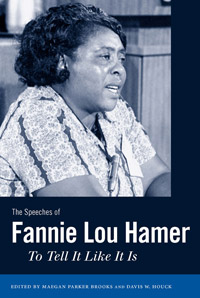 Maegan Parker Brooks and Davis W. Houck have compiled a volume of twenty-one of Fannie Lou Hamer’s most important speeches spanning her civil rights career, entitled The Speeches of Fannie Lou Hamer: To Tell It Like It Is. Published by University Press of Mississippi, this is the first collection of her speeches ever published.
Maegan Parker Brooks and Davis W. Houck have compiled a volume of twenty-one of Fannie Lou Hamer’s most important speeches spanning her civil rights career, entitled The Speeches of Fannie Lou Hamer: To Tell It Like It Is. Published by University Press of Mississippi, this is the first collection of her speeches ever published.
Fannie Lou Hamer was born in Montgomery County, Mississippi. In 1962 she entered the struggle for civil rights by becoming a voting rights activist and eventually a civil rights leader in the Student Nonviolent Coordinating Committee (SNCC). In 1963, Hamer barely survived being jailed in Winona, Mississippi after a cruel and vicious beating, in which white police forced African American inmates to take turns beating her throughout the night. This tragic experience marked her and yet strengthened her resolve to remain in the struggle for civil rights. Hamer was instrumental in the organization of the Mississippi Freedom Summer Project in 1964. Along with Annie Bell Robinson Devine and Victoria Gray Adams, she was among the first African American women to speak before the United States House of Representatives; all three were elected state representatives for the Mississippi Freedom Democratic Party for the National Democratic Convention in August of 1964 in Atlantic City, New Jersey.
From the publisher’s website:
Brooks and Houck have coupled these heretofore unpublished speeches and testimonies with brief critical descriptions that place Hamer’s words in context. The editors also include the last full-length oral history interview Hamer granted, a recent oral history interview Brooks conducted with Hamer’s daughter, as well as a bibliography of additional primary and secondary sources. The Speeches of Fannie Lou Hamer demonstrates that there is still much to learn about and from this valiant black freedom movement activist.
To purchase this book from the publisher’s website, click here. To read exclusive excerpts of Fannie Lou Hamer, visit our civil rights archive here.
